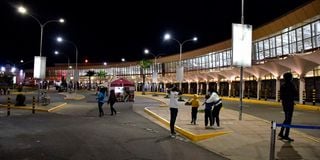DCI turns spotlight on JKIA staff over human trafficking

Anti-terror unit says airport staff are facilitating the illegal movement of people across international borders through the Jomo Kenyatta International Airport.
A section of staff at Kenya’s largest port of entry have been put on the spot by the Directorate of Criminal Investigations (DCI) amid claims that airport personnel are aiding human trafficking.
The DCI, through the Officer Commanding Anti-Terrorism Unit (ATPU), fired a memo dated September 6 to the Station Manager of Qatar Airways at Jomo Kenyatta International Airport (JKIA) warning that staff attached to various agencies at the facility are involved in the illegal activity.
“This office has noted with a lot of concern that people are being smuggled in and out of the country through JKIA with the assistance of airport staff which include 1) National Police Service personnel, 2) Kenya Airports Authority personnel 3) Airlines personnel and 4) Immigration personnel,” the memo said.
The anti-terror unit further said that airport staff are facilitating the illegal movement of people across international borders through the airport.
The ATPU also threatened legal action to anyone involved in human trafficking.
“This serves as a warning to all agencies named to desist from the practice. Legal action will be taken on anyone caught,” the letter said.
Middle Eastern countries are known for their poor labour and human rights record, and is widely considered one of the most dangerous places to work in the world. Employers in the Gulf States have been dogged by allegations of physical, mental and sexual abuse of their migrant housekeepers for years; claims which continue to resurface.
For example, migrant workers in Qatar cannot request or renew their residence permits on their own; this is the responsibility of the sponsor, according to the law. However, if the employer fails to renew the permit on time, the worker risks facing arrest, detention, and deportation, limiting their freedom of movement.
According to the United Nations Office on Drugs and Crime (UNODC), every year thousands of Kenyan men, women and children fall victim to illicit trafficking groups and smuggling of migrants’ syndicates, and endure inhumane treatment, sexual exploitation, slave-like working conditions and other abuse.
The US State Department in its 2022 Trafficking in Persons Report noted that Kenya remains a source, transit point and destination for people subjected to sex trafficking and forced labour.
The report observed that the Kenyan government does not fully meet the minimum standards for the elimination of trafficking but is making significant efforts to do so.
The Counter-Trafficking in Persons Act of 2010 criminalised sex trafficking and labour trafficking and prescribed penalties of 30 years to life imprisonment, a fine of not less than Sh30 million or both.





